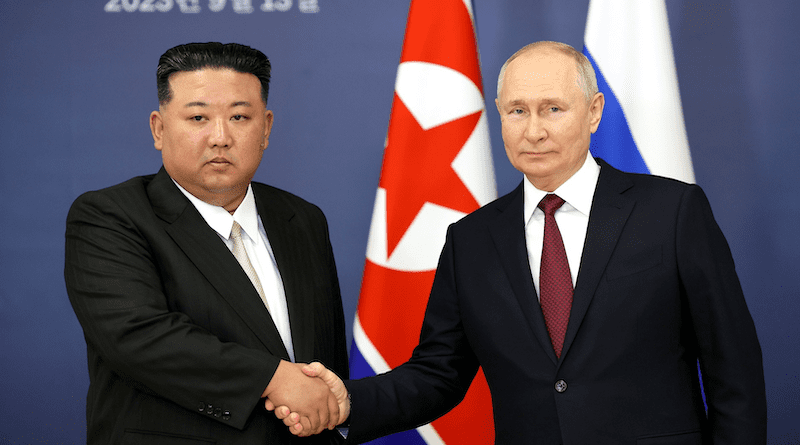Russia’s Putin To Meet Kim Jong Un In First Visit To North Korea Since 2000
By RFA
By Kim Soyoung and Ann Kim
Russian President Vladimir Putin will arrive in North Korea Tuesday for his first visit since 2000, the countries announced, where Putin and Kim Jong Un will sign a new treaty that addresses security issues.
The meeting between the two leaders, who last met in December, when Kim traveled to Vladivostok, is likely an attempt to boost their profiles at home and put some fear into their adversaries, experts said.
The two leaders will sign a new treaty that addresses security issues, a Kremlin adviser said.
Moscow has been cozying up to Pyongyang since its invasion of Ukraine in February 2022, and Washington has accused Moscow of using North Korean weapons there, which North Korea and Russia deny.
White House National Security Communications Advisor John Kirby said the trip was part of a charm offensive and that the Biden Administration was not concerned about the trip, but was concerned about the deepening relationship between Russia and North Korea.
“Not just because of the impacts it’s going to have on the Ukrainian people because we know North Korean ballistic missiles are still being used to hit Ukrainian targets, but because there could be some reciprocity here that could affect security on the Korean Peninsula.”
Pyongyang’s state-run Korean Central News Agency on Monday published a single sentence report confirming that the visit will occur on June 18 and 19.
“Several documents will be signed,” Putin’s foreign policy advisor Yury Ushakov told the state-owned Tass news agency. “This can be said about a comprehensive strategic partnership treaty. This document is also being worked on and if it is signed, it will replace the fundamental documents that were inked in 1961, 2000, and 2021.”
They will replace the 1961 Treaty of Friendship and Mutual Assistance, which stipulated that the Soviet Union would defend North Korea in the event of an attack, the 2000 Treaty of Friendship and Good Neighborly Cooperation, which replaced the Soviet-era treaty and put more emphasis on trade and less on military assistance, Tass said, citing Ushakov.
Russia’s Foreign Minister Sergei Lavrov, Defense Minister Andrei Belousov, and Deputy Prime Minister Alexander Novak will be part of Putin’s delegation.
RFA reported last week that satellite imagery of Kim Il Sung Square in Pyongyang indicated that preparations were underway for a large event, likely to kick off the two-day visit.
Get attention
The visit is a publicity opportunity for both Putin and Kim, said David Maxwell, vice president at the Center for Asia Pacific Strategy in Washington.
“Both Putin and Kim want to be talked about,” Maxwell told RFA Korean. “They want to be in the news and they want to make the ROK-U.S. alliance and the U.S. and the international community afraid of their cooperation,” referring to South Korea, also called the Republic of Korea.
In addition to sending a message internationally, the visit will also serve to boost both leaders’ profiles at home, he said.
The visit is “important for their domestic propaganda and so that they are able to enhance their legitimacy, their reputation internally because they are both suffering from internal threats,” said Maxwell.
He predicted that North Korea would likely get money and other resources in return for sending artillery ammunition and missiles to Russia.
He also said that he did not know whether any advanced technology would change hands, but should Russia deliver missile guidance tech, it would be an advancement for North Korea’s nuclear program.
It is hard to predict what sort of cooperation the meeting will bring, Bruce Klingner, senior research fellow for the Heritage Foundation, told RFA.
“(It) could be just strengthened relations and economic deals or increased economic interaction which would help North Korea,” he said, adding that both countries would likely remain tight-lipped about whatever they discuss behind closed doors, especially if it involves military technology transfers.
“I think they might be wary that it would trigger actions on sanctions against Russian or North Korean entities,” he said. “But certainly that has been a concern and a speculation for the last year.”
He acknowledged that some are speculating that Russia would even give tech that would enhance North Korea’s nuclear program, but most experts expect it to be related to conventional weapons, including aircraft and submarines.
Klingner also said that it is possible that Pyongyang and Moscow would seek to resurrect a formal agreement of friendship that might include an agreement from Russia to come to North Korea’s aid if it were attacked.
Following his two-day visit in North Korea, Putin is scheduled to travel to Vietnam for another two-day visit.

